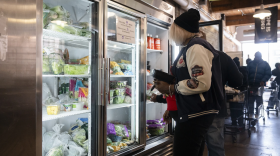-
City of Bloomington Township provided emergency food assistance to nearly 500 people whose SNAP benefits were denied during the recent federal government shutdown.
-
The McLean County Alliance for Community Services is composed of advocates for low-income families fighting for food and health care for all.
-
Republicans and Democrats continue blaming each other for the government shutdown even after the vote on a continuing resolution to fund the government until the end of January.
-
The state expects all 1.8 million Illinoisans who use the food assistance program to get full benefits by Nov. 20 after SNAP was delayed and reduced during the federal shutdown, which ended Wednesday night.
-
Two food drives in Bloomington-Normal this weekend aim to provide additional support to pantries amid rising demand.
-
Food banks in central Illinois are waiting to see how a federal judge's ruling on SNAP benefits will impact their operations. The Trump administration has been ordered to fully restore food assistance while the government is shut down.
-
Beneficiaries of the Supplemental Nutrition Assistance Program [SNAP] will only receive half of their normal payments, the Trump administration revealed in court this week.
-
The USDA declined to tap into additional funds, which will delay and reduce benefits.
-
Township supervisor Deb Skillrud says the program would provide temporary help to hundreds of families, who would be able to get between $200 and $500 per month — depending on the number of family members — for as long as funding is available.
-
Gov. JB Pritzker signed an executive order allocating $20 million in state funding as a stopgap measure to support Illinois’ seven food banks, which supply over 2,600 food pantries across the state.
Play Live Radio
Next Up:
0:00
0:00
Available On Air Stations










